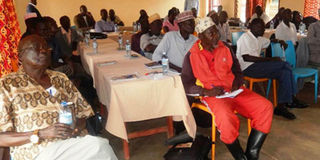Ex-combatants warned against new rebellion

Col Obitre Gama (left) and the ex-combatants attend a workshop in Yumbe District last week. PHOTO BY ROBERT ELEMA
What you need to know:
- Mr Akim Viga, the District Internal Security Officer, confirmed that it is true that some group of people have joined the rebel forces in South Sudan which he attributed to hunger.
- Once an ex-combatant is granted amnesty but decides to go back to the bush, the certificate is withdrawn and is liable to being subjected to courts of law.
Yumbe. The Amnesty Commission has cautioned ex-combatants in Yumbe District against joining rebel forces in South Sudan or forming new rebel groups in Uganda.
This follows security reports that some of the former servicemen have joined the rebel forces in South Sudan.
Speaking during a workshop for the district stakeholders and ex-combatants in Yumbe Town, the Lt Col (Rtd) Obitre-Gama, the head of Demobilisation and Resettlement Team (DRT) for North-western region, said: “From our consistent reports and sources while monitoring reporters (someone who takes steps to receive the amnesty) from Yumbe and Koboko, some of the reporters have been lured into fighting and have crossed into South Sudan in order to cause insecurity within the two districts.”
“We don’t want the ex-combatants to fight the Uganda government again. It is suicidal doing that; let them stop it,” he said.
Mr Obitre-Gama was not catagorocal about the number of those who have been lured into this rebel activity.
Once an ex-combatant is granted amnesty but decides to go back to the bush, the certificate is withdrawn and is liable to being subjected to courts of law.
During the signing of the agreement in 2002, more than 10,000 ex-combatants were demobilised with some joining Uganda People’s Defence Forces (UPDF) while others were integrated into the communities.
Mr Obitre-Gama said there were complaints about package but he assured the people that the issue of compensation for the ex-combatants was tackled including the 52 child soldiers who were handled by UNICEF and were sent to schools.
The West Nile districts of Yumbe, Koboko and Moyo suffered from the effects of war waged against President Museveni’s regime by the defunct Uganda National Rescue Front (UNRF) I under Gen Moses Ali, UNRF II under late Gen Ali Bamuze and West Nile Bank Front of late Juma Oris where several people were killed or lost property during the war.
The West Nile Bank Front was a fighting force that operated in West Nile region between April 1995 and May 1997 from Morobo in South Sudan and headed by late Brig Juma Oris Col Abdalatifa Tiyua.
Maj (Rtd) Noah Acikule, the former political commissioner of the then UNRF II, said from the time of signing the peace agreement in 2002 to date, the ex-combatants have remained peaceful but when the allegation came in, people started following the ex-combatants to find out whether they are still around.
“We have no interest to stage war against the government. The government is aware of what is happening. To solve this matter, we want to interface with the president to present our position on this matter,” he said.
He said the ex-combatants have settled but their efforts to engage in government projects such as fish farming, beekeeping, woodlot is being frustrated by some of the leaders who have negative attitude towards the ex-combatants.
Mr Ismael Tibo, an ex-combatant, said: “We strongly denounce rebellion. What is happening is an individual thing but it is not with the ex-combatants leadership. We can’t go against the government. All we want is for the government to fulfill the remaining pledges. We want the government interventions because people are eying at us.”
Mr Akim Viga, the District Internal Security Officer, confirmed that it is true that some group of people have joined the rebel forces in South Sudan which he attributed to hunger.



